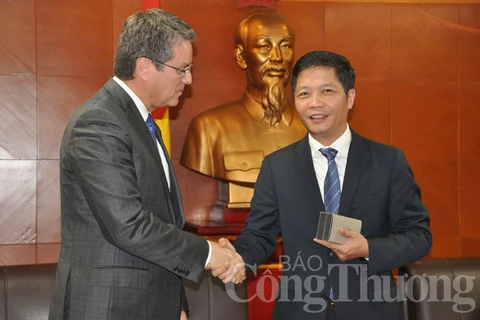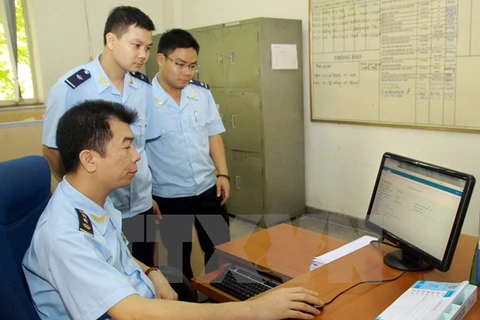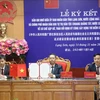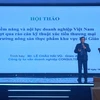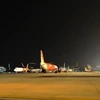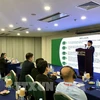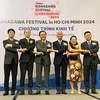Hanoi (VNA) – Vietnam has actively taken actions to realise the World Trade Organisation’s Trade Facilitation Agreement (TFA) since it took effect on February 22, 2017, said deputy head of the General Department of Customs’ International Cooperation Department Nguyen Thi Viet Nga.
During a press conference in Hanoi on August 22, Nga said the TFA is comprised of Category A commitments which are required to be delivered from the date of the TFA’s entry into force, Category B commitments which must be realised after a transitional period following the TFA’s validity, and Category C commitments that will be implemented on a date after a transitional period and require assistance in capacity building.
Vietnam reported the delivery of 15 Category A commitments to the WTO in July 2014.
The Vietnamese delegation to the WTO reported the country’s roadmap for delivering 14 Category B and 9 Category C commitments on August 2.
Nga said Vietnam has monitored the delivery of commitments regarding information access and transparency, complaint mechanism, customs clearance, and goods temporarily held by agencies for examination, among others.
The country has also refined legal regulations, mobilised technical support, and established the National Trade Facilitation Committee under the Government’s Decision No.1899/QD-TTg dated October 4, 2016 in order to realise the commitments.
The TFA will create a driving force to boost global trade and bring common benefits to WTO member states, especially developing ones, she said, adding that entry to the agreement will help step up the reform, simplification, and improvement of transparency in customs procedures; assist small- and medium-sized enterprises in exports; and attract more foreign direct investment in manufacturing and export, she said.
In the near future, the customs department will continue working closely with concerned agencies to fine tune legal regulations, while also implementing the national one-stop shop mechanism which will narrow the list of goods subject to specialised inspection and put an end to overlapping in specialised inspection, Nga said.
The TFA was adopted by WTO member states at the ninth WTO Ministerial Conference in Bali, Indonesia on December 7, 2013 and has become part of the organisation’s compulsory agreements since November 2014.
It is the first multilateral agreement signed in the 21 year history of the WTO, marking an important milestone in global trade systems and encouraging trade liberalisation.
According to a 2015 global trade report, full TFA delivery will help cut transaction costs by 14.3 percent on average and fuel global trade by 1 trillion USD each year. It will also save 1.5 days of customs clearance for imported goods, down 47 percent from the present average and nearly 2 days of customs clearance for exported ones, down 91 percent. –VNA
During a press conference in Hanoi on August 22, Nga said the TFA is comprised of Category A commitments which are required to be delivered from the date of the TFA’s entry into force, Category B commitments which must be realised after a transitional period following the TFA’s validity, and Category C commitments that will be implemented on a date after a transitional period and require assistance in capacity building.
Vietnam reported the delivery of 15 Category A commitments to the WTO in July 2014.
The Vietnamese delegation to the WTO reported the country’s roadmap for delivering 14 Category B and 9 Category C commitments on August 2.
Nga said Vietnam has monitored the delivery of commitments regarding information access and transparency, complaint mechanism, customs clearance, and goods temporarily held by agencies for examination, among others.
The country has also refined legal regulations, mobilised technical support, and established the National Trade Facilitation Committee under the Government’s Decision No.1899/QD-TTg dated October 4, 2016 in order to realise the commitments.
The TFA will create a driving force to boost global trade and bring common benefits to WTO member states, especially developing ones, she said, adding that entry to the agreement will help step up the reform, simplification, and improvement of transparency in customs procedures; assist small- and medium-sized enterprises in exports; and attract more foreign direct investment in manufacturing and export, she said.
In the near future, the customs department will continue working closely with concerned agencies to fine tune legal regulations, while also implementing the national one-stop shop mechanism which will narrow the list of goods subject to specialised inspection and put an end to overlapping in specialised inspection, Nga said.
The TFA was adopted by WTO member states at the ninth WTO Ministerial Conference in Bali, Indonesia on December 7, 2013 and has become part of the organisation’s compulsory agreements since November 2014.
It is the first multilateral agreement signed in the 21 year history of the WTO, marking an important milestone in global trade systems and encouraging trade liberalisation.
According to a 2015 global trade report, full TFA delivery will help cut transaction costs by 14.3 percent on average and fuel global trade by 1 trillion USD each year. It will also save 1.5 days of customs clearance for imported goods, down 47 percent from the present average and nearly 2 days of customs clearance for exported ones, down 91 percent. –VNA
VNA



